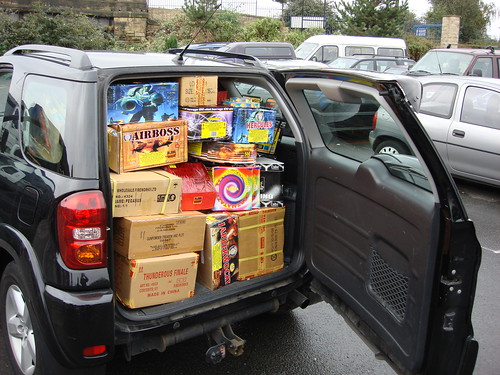Feast of The Holy Family of Jesus, Mary and Joseph (C)
Picture: cc Anders Ljungberg
Sisters and brothers, do you know what a zoom lens is? Of course you do. It’s something that you find in cameras. It helps you to vary the size and content of your image. When you zoom in, your focus narrows. You see less of the scene. But closer. When you zoom out, the image appears further away. But you get a wide-angle perspective. You see more. Close-up and wide-angle. Two different perspectives. Giving you a more complete view of whatever it is you wish to photograph. That’s what a zoom lens is for. It helps us see more of reality.
Now I may be wrong, sisters and brothers, but I think that something like a zoom lens is what we need especially today. On this Sunday in the Octave of Christmas. When we celebrate the Feast of the Holy Family of Jesus, Mary, and Joseph. For, typically, we celebrate this feast only by zooming in. We narrow our focus solely on our earthly families. And, by family, we usually refer only to the so-called nuclear family. Father, mother, children. Possibly, in some cases, also the domestic help. Traditionally, we celebrate this feast by looking to the Holy Family as a model for our own nuclear families.
And this is a praiseworthy thing to do. We may even say that it’s what our Mass texts are intended to help us to do. In the opening prayer just now, for example, we asked God to grant that we may imitate... the shining example of the Holy Family... in practicing the virtues of family life. And yet, have you ever found yourself wondering if this is perhaps too narrow a view of this feast? That, by limiting ourselves to using only the zoom-in function of our liturgical camera, we end up missing the bigger picture?
Again, I’m not sure, sisters and brothers. But I think that this is actually the case. And it’s made clear to us especially in the readings for this third year (Year C) of our Sunday cycle. If you take a closer look at the missal in your pews, you will notice that the readings for this feast are actually different in other years.
In the first reading for Year C, which we read just now, we hear the story of Hannah. And what is perhaps most striking about Hannah is how wide her view of family life is. For a long time, she has been shamefully barren. And when she does finally give birth to a son, she realises that he is God’s gift. I asked the Lord for him... and the Lord granted me what I asked. As a result, she does something truly remarkable. After weaning her precious child. After ensuring that he’s able to survive without his mother’s milk. She brings him to the Temple and surrenders him to God. Now I make him over to the Lord for the whole of his life.
How, my dear friends, is Hannah able to do this? To give up her precious son, on whom she would otherwise have depended to support her in her old age. Is it not only because she is able to zoom out? To see beyond her own earthly family. Which has her husband Elkanah as its head. To the much wider family to which we all belong. The household of God. And, having zoomed out, she is then able to zoom back in. To do what needs to be done in her own earthly family. To generously and selflessly offer her only son for the Lord’s service.
And isn’t this the kind of shift in perspective, the kind of zooming out and zooming in, that the Holy Family itself is struggling to negotiate in the gospel? The boy Jesus is twelve years old. He is almost a full-fledged member of his community. And, as all teenagers do even today, he begins to assert his independence. Not only does he, quite literally, get lost in the Temple. But he also shocks his parents with his response to their questions. When they finally find him, after 3 or 4 frantic days of searching. Why were you looking for me?’ Did you not know that I must be busy with my Father’s affairs?
Did you not know that I must be busy with my Father’s affairs? Or, in another translation, Did you not know that I must be in my Father’s house? More than just another episode of teenage rebellion, Jesus’ words and actions are actually an invitation to his parents to zoom out. To see beyond their own narrow view of family life on earth. To the wider context of the heavenly household of God. To remember that, even though Jesus is their son, he also has a heavenly Father. Whose mission he must accomplish. And this process of zooming out is not easy. Not even for Mary and Joseph. For we are told that they did not understand what he meant.
And yet, even though they didn’t understand, they remained open. They continued to ponder. Mary, in particular, stored up all these things in her heart. And isn’t it only because they remained open to the wider perspective of God’s household, that they were able to to live their family life on earth in the way it is meant to be lived? Jesus, we’re told, went down with them… to Nazareth… lived under their authority… and increased in wisdom, in stature, and in favour with God and men.
My dear friends, isn’t this the deeper lesson that the Feast of the Holy Family holds for us? A lesson in the use of a zoom lens. First to recognise and rejoice in our dignity as members of God’s household. And then, to allow this primary identity, this first belonging, this wide-angle perspective, to shape how we relate to others on earth. As the second reading reminds us, we are already the children of God. And, as children of God, we keep his commandments and live the kind of life that he wants. For we know that he lives in us by the Spirit that he has given us.
In this wide-angle, zoomed-out perspective, we already belong to God’s family. And this is a source of great joy and consolation for us. Even and especially for those of us who may feel lonely and depressed. Those of us who, for one reason or another, may not have an earthly family of our own. No spouse or children. No parents or siblings. Or those who come from a broken family. Or a family that faces struggles of one kind or another. Even in such difficult circumstances, we can still be joyful. For, as the psalmist sings, they are happy who dwell in your house, O Lord. They are happy who realise that they belong, first and foremost, to God’s family. That they are beloved sons and daughters of a compassionate and merciful Father.
And, being filled with joy in the Lord, we can then zoom back in to share that same joy with everyone around us. With the immediate members of our families, of course. But also with others. Those who may be related to us in no other way except by being members of God’s household. Especially those most in need of our help. At this point, it may be helpful to remember that, in our opening prayer just now, we asked God to help us imitate the Holy Family not just in practicing the virtues of family life, but also in the bonds of charity. Bonds that stretch far beyond our blood relations. To the ties that bind us in the blood of the Lamb. Whose birth we celebrate at Christmas. The Lamb born to gather us into the happy household of God.
Sisters and brothers, as we continue to immerse ourselves in the joy of Christmas, both in our families and beyond, how are you being invited to make better use your zoom lens today?





